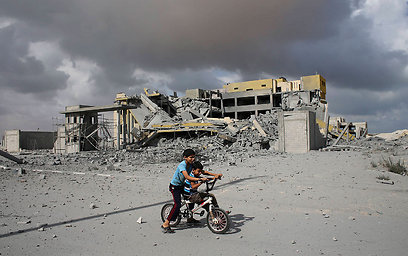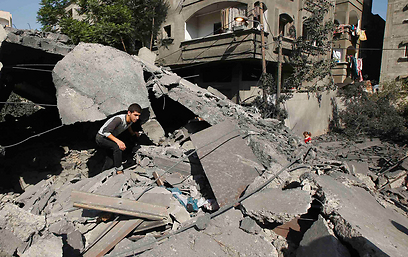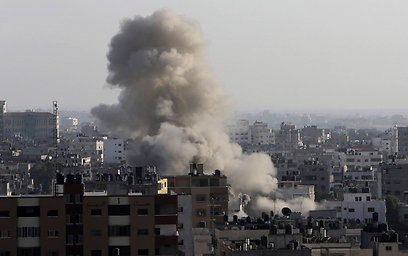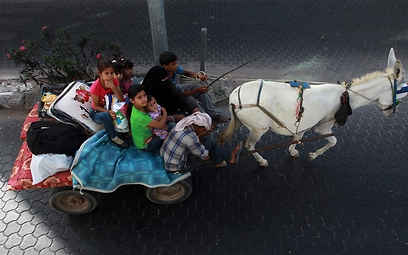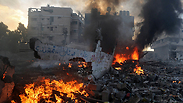
Inside Gaza: As fighting continues, situation for Gazans grows worse
Families flee Gaza City as Israeli attacks grow more intense: 'People are so angry that they support Hamas,' says Gazan, while boy asks: Am I going to die too?
Nuseirat Refugee Camp, Gaza – Mohammed Abdel Fatah Badawi is hosting 45 people in his home here in central Gaza. They are all relatives who fled the heavy fighting in Gaza City and have come to stay with him where it is relatively safer.
“Thank God, we are managing,” Badawi, an ambulance driver, told The Media Line. “We had some food in the house and I have been able to go out briefly and get more. The women sleep in the bedrooms and the men are sleeping outside in the garden or on the roof.”
Badawi says that frequent Israeli air attacks and artillery shelling make it dangerous for them to leave the house. They are glued to the radio and television and spend most of their day on the phone, checking in with friends and relatives. He says he has no idea when the fighting will end or what a cease-fire might mean for him. He says that he supports Hamas, which has continued to fire rockets at Israel despite its many attacks against Gaza-based targets that have left more than 700 dead.
“We prefer the fighting to being humiliated,” he said. “We want Hamas to keep fighting until there is an end to the Israeli siege of Gaza and the borders are open.”
One of Hamas’s key demands is that both Israel and Egypt - the countries bordering the densely populated enclave that is home to 1.8 million people – open their borders for the transfers of goods and people. Neither Israel nor Egypt is expected to accept an open border with Gaza, although both have allowed humanitarian cases to enter.
At least 118,000 Gazans have fled their homes to take shelter in schools run by UNRWA, the United Nations Relief and Works Agency.
“There are 40 or 50 people staying in one classroom,” Adnan Abu Hasna, the spokesman for UNRWA in Gaza told The Media Line. “We provide them with some food like bread and cans of tuna, but we don’t have enough mattresses or blankets for them.”
He said UNRWA’s 77 schools are filled to capacity. He also said that Israel had fired on several schools even though the Israeli army knew there were civilians in the area. Israeli officials point to two separate incidents in which Hamas rockets have been discovered inside vacant UNRWA school buildings as proof that the Islamists are using schools, mosques and even hospitals as cover for their rocketry. The UN is still investigating where the rockets were moved to after they were found.
Palestinians living in the Gaza Strip describe the environment as being filled with chaos and fear after 17 days of Israeli bombardment.
“Both of my sons, age 3 and 5, have started wetting the bed at night,” Ahmed Abu Hamda, a Palestinian journalist told The Media Line. “My younger son Mohammed is waking up at night having nightmares and screaming and it takes us a long time to calm him down. I know I’m going to have to deal with it, but it will have to wait until after the war ends.”
Abu Hamda says he is careful not to let his children watch the news with the images of dead and dying Palestinian children. But his older son Mustafa saw a photo on his laptop of a dead Palestinian child and asked his father, “Am I going to die too?”
Abu Hamda’s family lives on the eighth floor of a nine story building. He worries that shrapnel from an Israeli strike could shatter the windows, so last week he moved his family to a relative’s house a few blocks away where there had been less shelling.
“Yesterday I went back to my apartment to get some things and all of the windows were broken in my sons’ bedroom,” he said. “There was a big piece of shrapnel on my son’s bed. What would have happened if they had been home?”
One of Abu Hamda’s colleagues, a cameraman, was killed last week, and several of his friends have lost relatives. He says the mood in Gaza is a mixture of depression and anger, and he believes support for Hamas has grown. Before the launch of the Israeli incursion named Operation Protective Edge, polls showed that support for Hamas had dropped significantly.
“People are so angry that they support the resistance,” he said. “They want a peaceful life, but they feel they have no other choice. They are saying ‘hit them (Israel) the way they hit us.’”
Abu Hamda says there is a growing sense in Gaza that life is precarious.
“Every day when I leave for work, I kiss my wife and kids good-bye because I think I may never see them again,” he said. “And every night when I come home, I thank God that He gave me another chance to see them.”
Article by Linda Gradstein and Rami Almagheiri
Reprinted with permission from The Media Line










